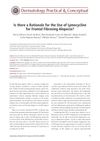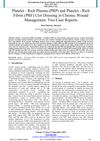 January 2025 in “Acta Dermato Venereologica”
January 2025 in “Acta Dermato Venereologica” Mothers with alopecia areata have a higher risk of adverse birth outcomes.
 December 2024 in “Cureus”
December 2024 in “Cureus” Baricitinib treatment for alopecia universalis can cause hair regrowth with unexpected whitening.
 August 2024 in “Indian Journal Of Clinical Practice”
August 2024 in “Indian Journal Of Clinical Practice” A balanced diet and healthy lifestyle help manage PCOS symptoms.
 July 2024 in “ADMET & DMPK”
July 2024 in “ADMET & DMPK” Surface-modified nanostructured lipid carriers can improve hair growth treatments.

Injectable PRF therapy may help with hair growth and skin rejuvenation, but more research is needed.
 June 2024 in “Al- Anbar Medical Journal”
June 2024 in “Al- Anbar Medical Journal” Acute telogen effluvium can be resolved by addressing causes, but chronic telogen effluvium is harder to treat.
 April 2024 in “Proceedings”
April 2024 in “Proceedings” People with alopecia areata often have lower iron levels than healthy people.
 April 2024 in “Journal of asthma and allergy”
April 2024 in “Journal of asthma and allergy” Abrocitinib effectively treated severe atopic dermatitis and mild alopecia areata in a 12-year-old boy after dupilumab failed.
 March 2024 in “Asian journal of beauty & cosmetology”
March 2024 in “Asian journal of beauty & cosmetology” Derma Genie™-H001 can help prevent hair loss and promote hair growth.
 March 2024 in “Majallah-i taḥqīqāt-i ̒ulūm-i pizishkī-i Zāhidān/Majallah-i taḥqīqāt-i ̒ulūm-i pizishkī-i Zāhidān./Zahedan journal of researches in medical sciences”
March 2024 in “Majallah-i taḥqīqāt-i ̒ulūm-i pizishkī-i Zāhidān/Majallah-i taḥqīqāt-i ̒ulūm-i pizishkī-i Zāhidān./Zahedan journal of researches in medical sciences” Microneedling with PRP effectively reduces facial pigmentation with minimal side effects.
 March 2024 in “Clinical, cosmetic and investigational dermatology”
March 2024 in “Clinical, cosmetic and investigational dermatology” Tofacitinib successfully treated vitiligo in a patient with lupus without side effects.
 March 2024 in “Clinical, cosmetic and investigational dermatology”
March 2024 in “Clinical, cosmetic and investigational dermatology” Upadacitinib may effectively treat alopecia areata without side effects.
 February 2024 in “International journal of medical science and clinical research studies”
February 2024 in “International journal of medical science and clinical research studies” CCCA is a scarring hair disorder mainly affecting people of African descent, needing better awareness and treatment.
 February 2024 in “Journal of Health Science and Medical Therapy”
February 2024 in “Journal of Health Science and Medical Therapy” ADAM17 could be a potential target for treating PCOS.
 January 2024 in “Dermatology practical & conceptual”
January 2024 in “Dermatology practical & conceptual” Lymecycline may help with Frontal Fibrosing Alopecia but needs more research.
 January 2024 in “Frontiers in immunology”
January 2024 in “Frontiers in immunology” Histone modification is key in treating chronic inflammatory skin diseases.
 January 2024 in “International journal of homoeopathic sciences”
January 2024 in “International journal of homoeopathic sciences” Early intervention and patient education are crucial for managing alopecia areata.
 December 2023 in “International journal of multidisciplinary research and analysis”
December 2023 in “International journal of multidisciplinary research and analysis” SH-MSCs gel reduced IL-6 and increased TGF-β, suggesting it could treat alopecia.
 December 2023 in “International journal of multidisciplinary research and analysis”
December 2023 in “International journal of multidisciplinary research and analysis” SH-MSCs gel can effectively treat alopecia by increasing IL-10 and decreasing TNF-α gene expression.
 December 2023 in “Y Dược học”
December 2023 in “Y Dược học” Older adults in Vietnam often experience hair loss after COVID-19, especially women, singles, and those hospitalized.
 November 2023 in “Klìtinna ta organna transplantologìâ”
November 2023 in “Klìtinna ta organna transplantologìâ” MSC-derived exosomes can help treat COVID-19, hair loss, skin aging, and arthritis.
 October 2023 in “Benha Journal of Applied Sciences”
October 2023 in “Benha Journal of Applied Sciences” PPAR-γ may be a key target for treating alopecia areata and other skin conditions.

Women with PCOS are at higher risk for gum disease, and managing shared risk factors can help both conditions.
 October 2023 in “Research Square (Research Square)”
October 2023 in “Research Square (Research Square)” Oxidative stress is linked to mild patchy alopecia areata.
 September 2023 in “Medical & Clinical Case Reports Journal”
September 2023 in “Medical & Clinical Case Reports Journal” Platelet-Rich Plasma (PRP) may increase hair density and thickness in Androgenetic Alopecia, but it's not significantly better than a placebo.
 September 2023 in “Research Square (Research Square)”
September 2023 in “Research Square (Research Square)” TNC+ fibroblasts play a key role in skin inflammation by interacting with T cells.
 September 2023 in “International Journal of Science and Research (IJSR)”
September 2023 in “International Journal of Science and Research (IJSR)” PRP and PRF can effectively heal chronic wounds.
 August 2023 in “Sabuncuoglu Serefeddin Health Sciences”
August 2023 in “Sabuncuoglu Serefeddin Health Sciences” CT60 polymorphism might increase the risk of Alopecia Areata.
 July 2023 in “Dermatology and therapy”
July 2023 in “Dermatology and therapy” People with alopecia areata may have a higher risk of blood clots.
 July 2023 in “The Egyptian Journal of Hospital Medicine ”
July 2023 in “The Egyptian Journal of Hospital Medicine ” Alopecia areata is a hair loss condition caused by immune factors and can be treated with JAK inhibitors.






























